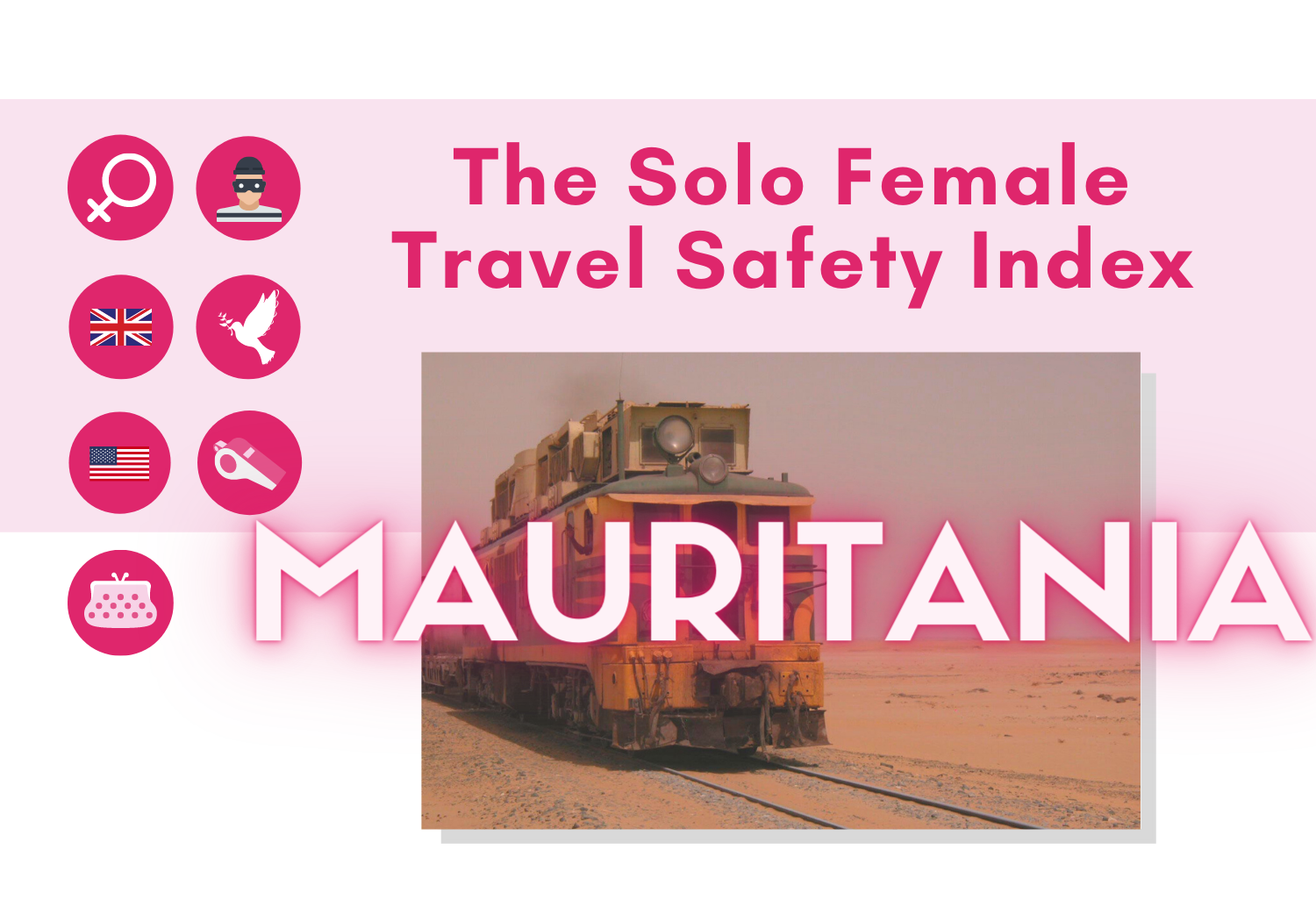This post may contain affiliate links. For full information, please see our disclaimer here and our Privacy Policy here.
Welcome to the Solo Female Travel Safety Tips and Advice page for Mauritania!
This page is brought to you by Solo Female Travelers Tours, our curated small group trips for women, by women.
On this page you will find first-hand, unbiased, and real safety tips, advice and reviews from women traveling solo, submitted directly from their personal experiences in the country.
Their opinions are unfiltered and submitted independently as part of the Solo Female Travel Safety Index, a ranking of 210 countries and regions based on how safe they are for women traveling solo.
The safety scores range from 1 to 4 with 1 being the safest and 4 being the most dangerous for solo female travelers.
You don’t need to login to read the below reviews. But do sign up or login to share your solo travel experiences, country safety rating and comments.
Jump straight to: Travel Tips | About the Index | Resources I Leave a Review
MAKE A DIFFERENCE – LEAVE YOUR SAFETY REVIEWS!
We can make the world a safer place for women traveling solo together. Sign up to our portal and leave your reviews NOW. Share your experience with other solo female travelers and help us empower more women through travel.
Mauritania Country data
We have compiled a few data points below that can help you better understand Mauritania and have more context when thinking about travel safety.
Official country name: Islamic Republic of Mauritania.
Etymology: Named for the ancient kingdom of Mauretania (3rd century B.C. to 1st century A.D.) and the subsequent Roman province (1st-7th centuries A.D.), which existed further north in present-day Morocco. The name derives from the Mauri (Moors), the Berber-speaking peoples of northwest Africa.
Country map
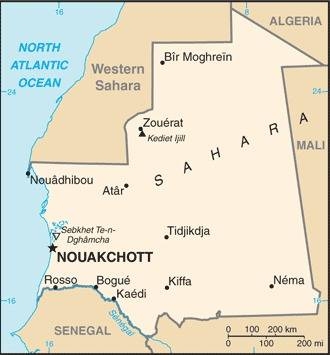
Locator map
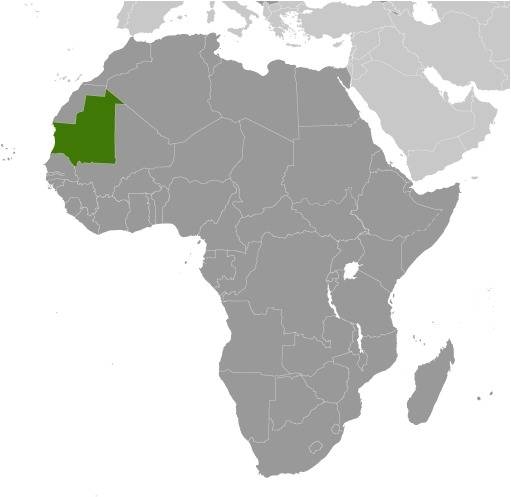
Flag
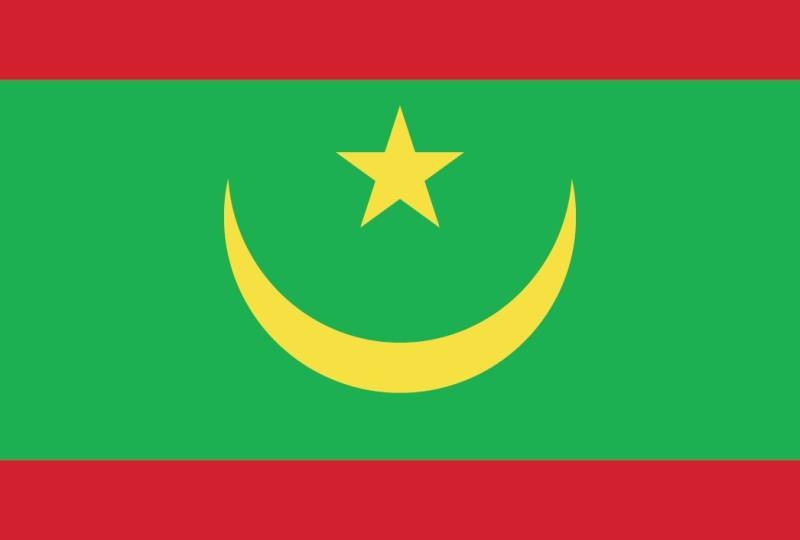
Capital: Nouakchott.
Independence / foundation: A former French colony, Mauritania achieved independence from France in 1960. It initially began its years as a free country with a French-appointed single-party, authoritarian regime and saw 49 years of dictatorships, flawed elections, failed attempts at democracy, and military coups.
In 2007, democratic elections took place for the first time but a subsequent military coup in 2008 brought back instability and more years of constant changes, authoritatian regimes and complaints of corruption. A democraticly elected civiliant president was sworn in in 2019 not without criticism on election irregularities.
Population: 4 million.
Currency: Mauritanian Ouguiya (MRO)
1 USD = 39.67 - 40.07 MRO
1 EUR = 42.60 - 43.55 MRO
Time zone: UTC 0
Languages spoken: Arabic (official and national), Pular, Soninke, Wolof (all national languages), French. Note - the spoken Arabic in Mauritania differs considerably from the Modern Standard Arabic used for official written purposes or in the media; the Mauritanian dialect, which incorporates many Berber words, is referred to as Hassaniya.
Religions: Muslim (official) 100%.
Climate: Desert climate that is constantly hot, dry, dusty.
Real GDP (ppp – purchasing power parity): $25.2 billion.
Real GDP per capita (ppp): $5,300.
Main airports: Nouakchott–Oumtounsy International Airport, Nouadhibou International Airport.
World heritage sites in Mauritania
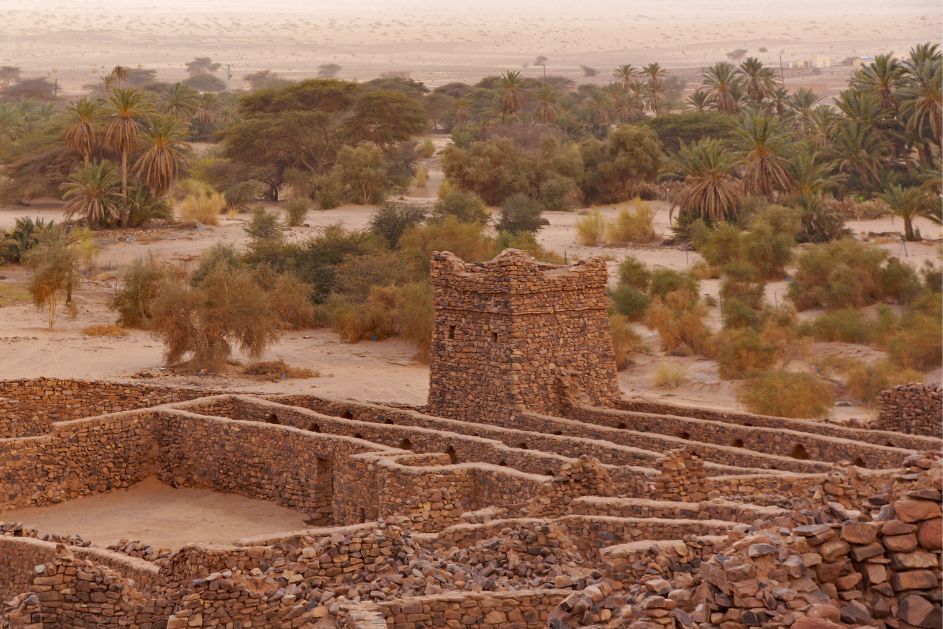
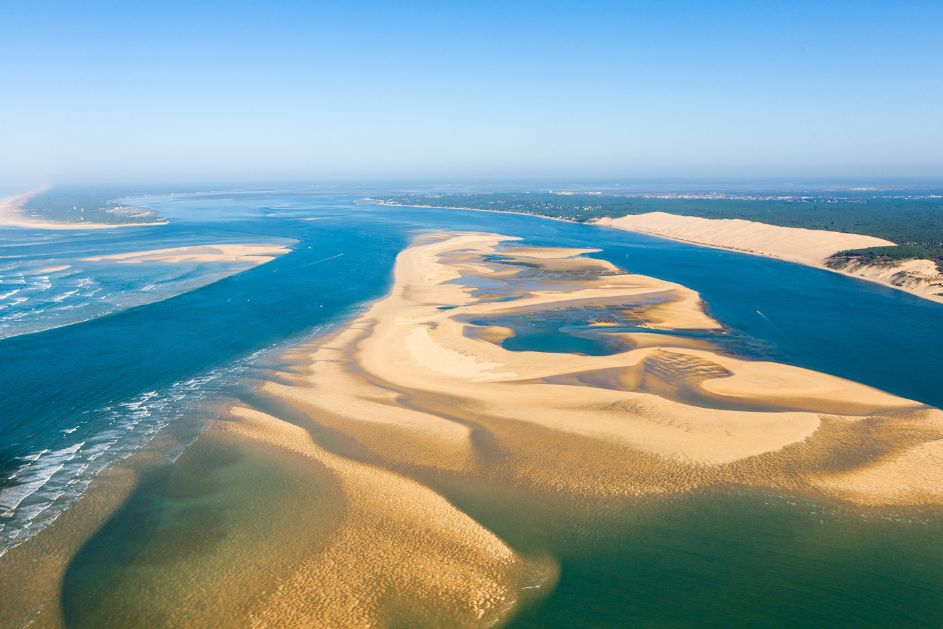
There are over 1,100 world heritage sites spread across more than 165 countries. New ones are added every year, and some may be removed from the list for various reasons.
Number of UNESCO listed sites: 2.
Top world heritage sites:
- Banc d'Arguin National Park.- Ancient Ksour of Ouadane, Chinguetti, Tichitt and Oualata.
Interesting facts about Mauritania
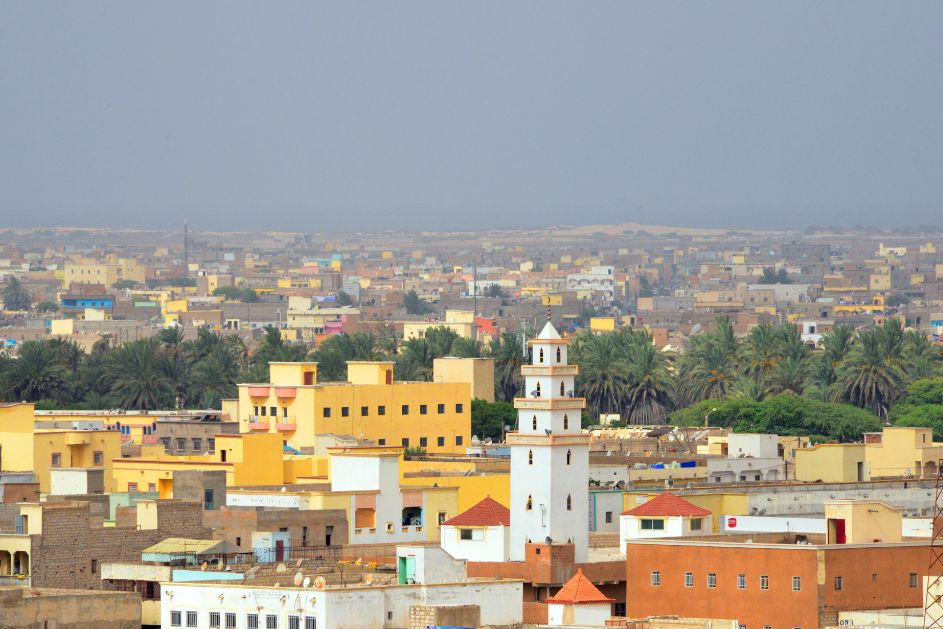
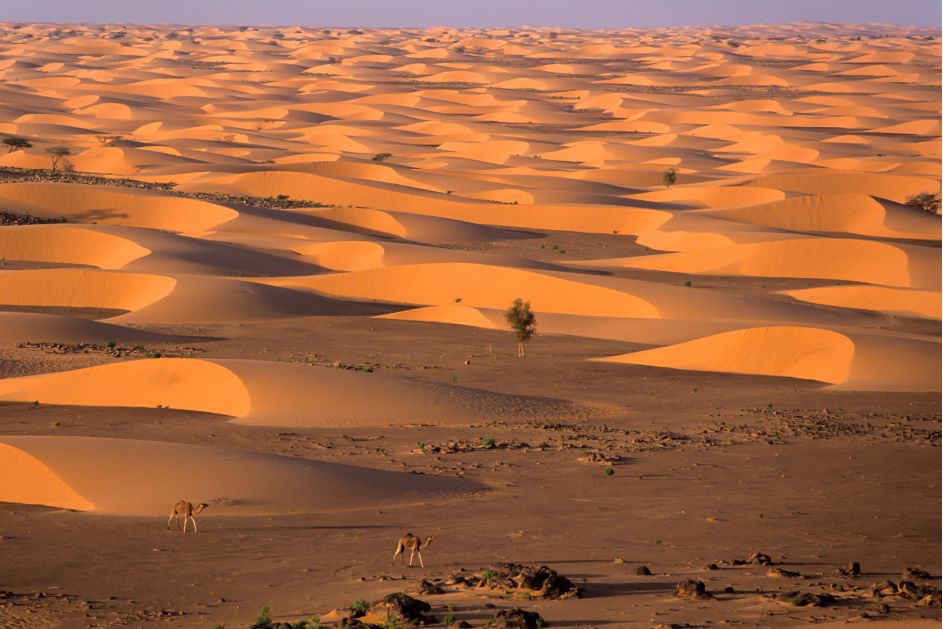
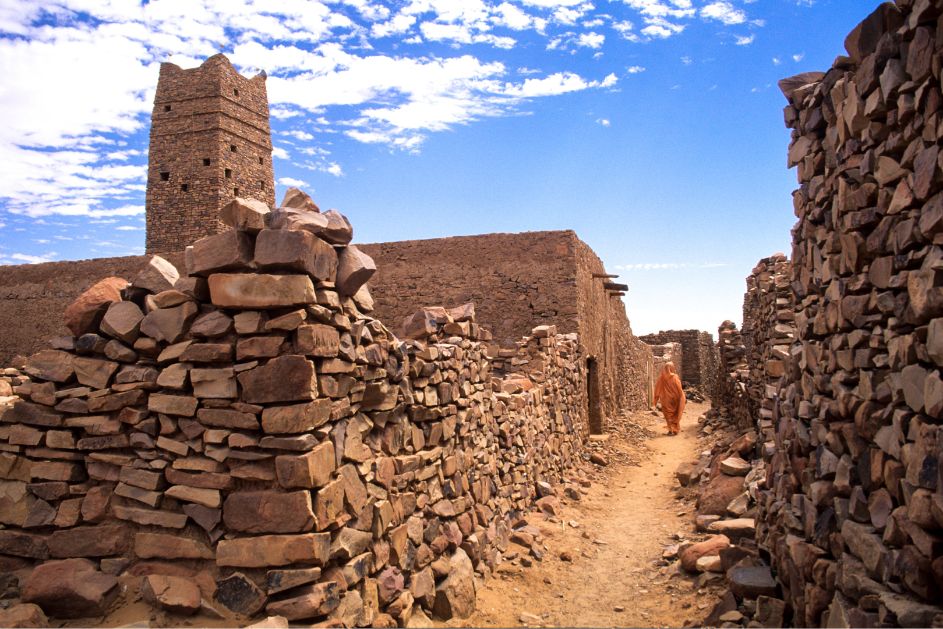
- UNESCO-listed Archaeological Site of Volubilis in Morocco, was the ancient capital of Mauritania. It displays remains of the Roman city that was built there.
- Mauritania was the last country in the world to abolish slavery in 1981.
- Mauritania is rich in mineral resources such as iron ore, gold, copper, gypsum, phosphate rock. Several of the very few tourists who visit the country ride the Iron ore train, a 24h cargo train journey across the Sahara Desert.
Further reading: N/A.
Mauritania Travel tips
Socket type: C / E / F. Guide to socket types.
Weekend days: Saturday and Sunday.
Driving: Cars drive on the Right.
Local taxi apps: Asfar.
Travel Guides: Lonely Planet.
Languages spoken: Arabic (official and national), Pular, Soninke, Wolof (all national languages), French. Note - the spoken Arabic in Mauritania differs considerably from the Modern Standard Arabic used for official written purposes or in the media; the Mauritanian dialect, which incorporates many Berber words, is referred to as Hassaniya.
Basic words and phrases in the main language:
Hello: Marhaba or As-salaam 'alykumPlease: Law samaht
Thank you: Shukran
Help: Mosa’adah
Learn more with our favorite learning app Mondly.
Find a hotel in Mauritania
Booking.comBook tours and activities:
Not available.More about Mauritania on Solo Female Travelers
Coming soon.Did you spot any errors? We do our best to keep this information updated and accurate, but things change. If you saw anything that is not right, let us know so we can fix it: [email protected].
About the Solo Female Travel Safety Index
Safety matters to solo female travelers, you told us so in our annual Solo Female Travel Survey, where year after year, women prove that this is their most important concern when traveling solo.
We wanted to do something about it, so we built these country-specific pages where you can find reviews and scores for 7 key variables affecting the safety of women traveling solo.
Variables
- Risk of scam
- Risk of theft
- Risk of harassment
- Attitudes towards women
- UK Travel Advisory
- US Travel advisory
- Global Peace Index (GPI)
Informing OSAC
The Solo Female Travel Safety Score is used by the Overseas Security Advisory Council for including safety concerns for women travelers in their country security reports; OSAC is a partnership between the U.S. Department of State and private-sector security community.
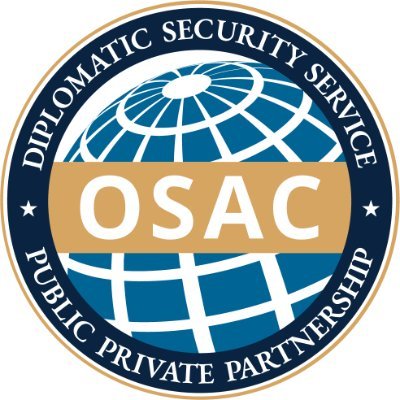
How to use the Safety Index
On this page, you will find the country score and the personal opinions on safety of other women traveling solo.
You can sort the comments by:
- The level of experience traveling solo of the reviewer (beginner = <5 trips solo, Intermediate = 5 to 10 trips solo, Experienced = >10 trips solo).
- The age of the traveler.
- Whether they are a visitor or local.
- The date they were posted.
The safety scores range from 1 to 4 with 1 being the safest and 4 being the most dangerous for solo female travelers.
Thus, the lower the score, the safer the country.
Looking for more safety resources?
This entire website is devoted to helping women travel solo. Check out the links below to learn more:
Solo Female Travel Stats: Results from the the largest, most comprehensive and only global research study on solo female travel trends, preferences and behaviors published.
Thanks to Jacobo Vilella for creating the Solo Female Travelers Safety Index ❤️

